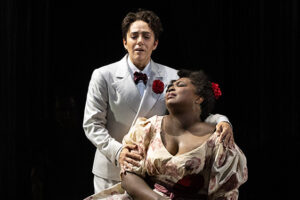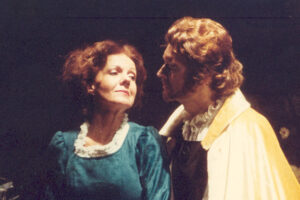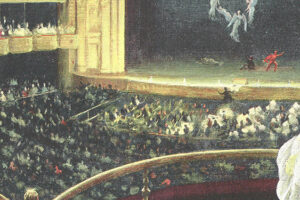

In the many years since this production premiered, directors have peered deeply into the disturbing cross-cultural conflicts that shimmer below the surface of Christoph Friedrich Bretzner’s ambiguous libretto. But Stephen Pickover’s broad revival of Dexter’s original—in Jocelyn Herbert’s blindingly-lit cartoon-cutout sets—always went for the easy laughs; there was little danger in either the June Taylor-synchronized marching of the Pasha’s troops or the gleaming pecs-and-abs atop flimsy see-through harem pants of the guards.
Only Shagimuratova’s grim anguish leavened by flashes of defiance suggested that her “stay” at the Pasha’s harem might have been something darker than an extended exotic vacation.
The soprano from Uzbekistan tackled Konstanze’s demanding music with sometimes striking fire. She bravely executed her fiendish entrance aria “Ach ich liebte” with éclat, but her two subsequent arias were slightly less impressive—a slightly rushed “Traurigkeit” failed to plumb the depths of this piercingly sad aria and “Marten aller arten” exposed Shagimuratova’s weak lower register and lack of a real trill. But this was a brave first stab at the fiercely challenging role.
Unfortunately, neither her opaque demeanor nor her sometimes coldly glistering soprano engendered much sympathy for the prisoner who strode about the compound with the hauteur of an entitled prima donna.
Perhaps she was just expressing some believable ambivalence about the men in her life. As the elegant if unthreatening Pasha Selim, Matthias von Stegmann returned to the role of his 2003 Met debut. He attempted to inject some tension and suspense into the oddly rollicking evening, but that was nearly impossible when he was clad first in pink and orange and then in all-white—each outfit becomingly topped off with feathered turbans.
That Konstanze might have been tempted by this maturely handsome Pasha was understandable given that her alternative was Paul Appleby’s strenuous and jejune Belmonte. One sought in vain for some vocal beauty in his four exquisite extended arias of yearning. Instead he planted himself at the edge of the stage and stressed and strained his way through them, nearly coming apart in the florid “Ich baue ganz.”

Appleby was more at ease in the hijinks with Pedrillo perhaps because Belmonte’s extravagantly over-the-top cape-twirling fit in well with the evening’s relentless comic business. Lanky Brenton Ryan in his Met debut as the manservant gamely pranced around the stage with verve, and his potent “Frisch zum Kampfe” revealed some strong high notes. However, the vivacious duet with Osmin lacked sparkle, and he plowed loudly and charmlessly through the varied verses of his fetching third-act serenade.
No doubt he was also stumped as how to interact with Kathleen Kim’s relentlessly perky Blondchen. Her bright soprano has grown bigger and brassier, and while she sailed through the maid’s music handily, one might have been forgiven for thinking she was once again singing Olympia. Her typical demeanor was to smile maniacally into the auditorium, plant her hands firmly on her hips and steadfastly ignore anyone else on stage, even the hammy, galumphing Osmin of Hans-Peter König.
The German bass, who has shone in Wagner roles at the Met ever the past few seasons, became the most buffoonish harem-overseer possible, goofing around the stage and singing carelessly, ending up out-of-sync with the orchestra on more than one occasion. Both his usually surefire “Solche hergelauf’ne Laffen” and “O, wie will ich triumpheren” fell flat, lacking both solid low notes and a sense of menace.
Meanwhile Maestro seemed to be having a good time at ease with the antique production familiar to him since he conducted its premiere in 1979. Maybe he knows what to make of the trees in the second act dotted with what looks like fried eggs? In any case, his fleet tempi sometimes tripped up his busy soloists while the reduced chorus sounded distressingly squally in its Janissary-influenced music. Levine did manage to guide his ragged quartet of lovers to a satisfying reunion quartet.
But this needs to be the last time Met audiences are subjected to this decrepit and shallow take on Mozart’s complex masterpiece. A priority for the next Met music director must be a new production that at least acknowledges the disturbing issues that roil beneath the surface of Die Entführung aus dem Serail. In the meantime one can at least enjoy Shagimuratova’s occasionally thrilling heroine—and perhaps Ben Bliss on April 30 may prove her worthy rescuer.
Photo by Ken Howard/Metropolitan Opera.
























Comments